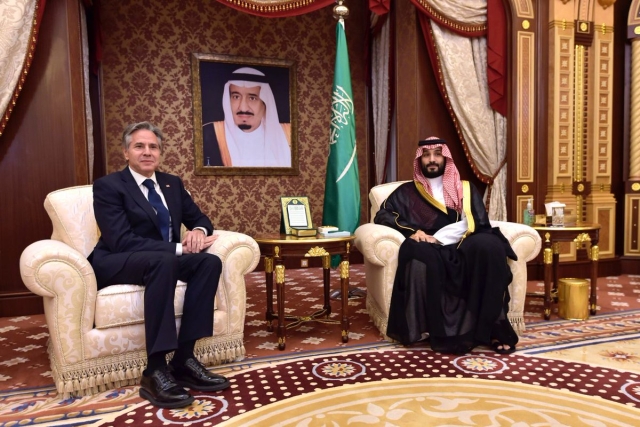Saudi Arabia is resolute in its quest to secure a military agreement that would bind the United States to come to its defense if needed. In exchange, Saudi Arabia is willing to uphold the normalization deal with Israel, even if Israel does not offer significant concessions to the Palestinians. This revelation comes from a Reuters report, citing insights from three regional officials who are well-versed in the intricacies of the ongoing negotiations.
According to the report, Saudi Arabia will not be granted protection akin to that of a NATO member state. Instead, it seeks an agreement resembling those the United States has with various Asian nations. In the event that the U.S. Congress does not grant approval, the agreement might mirror the one the U.S. maintains with Bahrain, home to its Fifth Fleet base—a pact that does not necessitate congressional endorsement.
An American source has added that Washington has the capacity to sweeten the deal by designating Saudi Arabia as a major non-NATO ally, a status already conferred upon Israel. As per the report, Saudi Arabia has made it abundantly clear that it will settle for nothing less than firm commitments from the U.S. to safeguard its interests in the face of potential threats, similar to the attack attributed to Iran in September 2019 against its vital oil facilities.
BREAKING:
— Megatron (@Megatron_ron) September 29, 2023
Reuters:
Saudi Arabia is seeking a military pact that would require the United States to defend the Kingdom in return for establishing ties with Israel.
The United States will be forced to militarily protect a member of the BRICS, to prevent Saudi Arabia from… pic.twitter.com/NjHadXfVOv
These agreements, wherein Saudi Arabia obtains American protection in return for normalizing relations with Israel, could potentially reshape the Middle East by fostering closer ties among nations and fortifying the relationship between Riyadh and Washington, especially in the wake of China's increasing involvement in the region. For President Biden, it would constitute a significant diplomatic triumph in the run-up to the 2024 U.S. presidential election.
Regarding the Palestinians, sources informed Reuters that while they may secure certain concessions from Israel, these concessions are unlikely to take place within Palestinian territory. The normalization, it seems, will primarily be a bilateral affair between Israel and Saudi Arabia. Should the Palestinians choose to resist, Saudi Arabia appears determined to proceed with its course of action. One official stated, "Saudi Arabia supports a peace plan for the Palestinians, but this time it wanted something for itself and not just for them." A source in Washington privy to the details disclosed that Crown Prince Mohammed bin Salman had initially sought a treaty akin to NATO's, though the U.S. was reluctant to commit to an arrangement identical to NATO's Article 5, which considers an attack on one ally an attack on all.
The Crown Prince of Saudi Arabia reveals that there are normalization talks with Israel, and that Israel is a player in the Middle East. 🇮🇱🕊️🇸🇦 #MBS #Saudi #Israel pic.twitter.com/p9Cyxi0i4Z
— Hananya Naftali (@HananyaNaftali) September 21, 2023
The source hinted that advisers to President Biden might consider an agreement akin to those with Japan and other Asian allies. Such agreements typically involve U.S. commitments to provide military support while being less specific about stationing American forces on foreign soil. Nonetheless, it is worth noting that some U.S. lawmakers may voice opposition to such an agreement. Riyadh, on its part, has shown a willingness to make concessions on various fronts to facilitate an agreement, even in areas related to its civilian nuclear technology plans. The source revealed that Saudi Arabia is prepared to sign Section 123 of the U.S. Atomic Energy Act, which establishes a framework for U.S. nuclear cooperation for peaceful purposes—a step that Riyadh had previously been hesitant to take.


